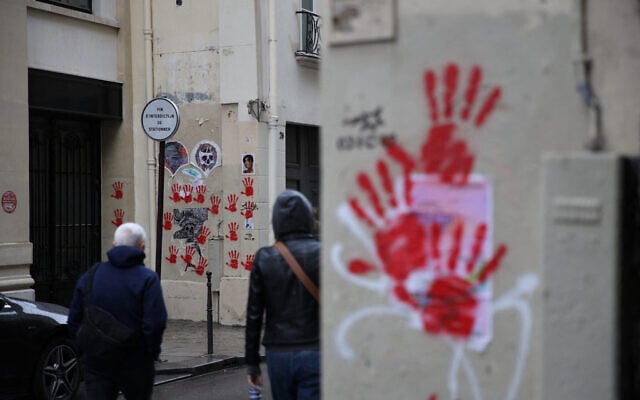The streets of Paris were shaken this past weekend by an act of vandalism targeting cherished Jewish sites, including a Holocaust memorial and two synagogues. This disturbing event underscores the alarming persistence—and rise—of antisemitism in France and across Europe.
The Incident: Vandalism Unfolds
Between Friday night and early Saturday morning, the Wall of the Righteous—honoring over 3,900 individuals who risked their lives to rescue Jews during the Holocaust—was defaced with green paint, obscuring its engraved names. The memorial, located in the Marais district, holds deep historical and symbolic importance.
In the same incident, two synagogues and the well-known Israeli restaurant Chez Marianne were also targeted. Surveillance footage captured a man in black throwing paint at multiple sites around 4:30 a.m. An abandoned paint can was later recovered by authorities.
Official Reactions and Global Condemnation
Paris Mayor Anne Hidalgo swiftly condemned the act as a “disgrace,” reaffirming that antisemitism has no place in the French Republic. She vowed that city workers would remove the defacement promptly and that a formal investigation was underway.
French Interior Minister Bruno Retailleau called for immediate security reinforcements at Jewish institutions, especially ahead of the Jewish holiday of Shavuot. He described the acts as “odious” and reflective of deeper societal issues.
Israeli President Isaac Herzog, whose great-grandfather founded one of the vandalized synagogues, expressed “immense disgust” and urged French authorities to act decisively to protect Jewish life and legacy in Europe.
A History of Antisemitic Incidents in France
This is not an isolated episode. The Wall of the Righteous was defaced just last year with red handprints in an incident linked to Bulgarian nationals allegedly associated with Russian disinformation campaigns. In another case, 250 blue Stars of David were painted across Paris, believed to be part of coordinated efforts to stoke division and hate.
These patterns reflect the troubling normalization of antisemitic imagery and violence, often fueled by external manipulation and internal sociopolitical tensions.
Community Response: Resilience and Resolve
The Jewish community in Paris, while no stranger to vigilance, is increasingly alarmed by the frequency of such attacks. Community leaders have renewed calls for both short- and long-term security enhancements for synagogues, schools, and cultural centers.
Local organizations have mobilized quickly, offering support and solidarity to affected institutions. Their response reflects both resilience and determination to preserve Jewish identity and security in the face of mounting threats.
The Broader Context: Antisemitism Rising Across Europe
The Paris incident echoes a wider surge in antisemitism across Europe, exacerbated by political polarization, disinformation campaigns, and the aftermath of the COVID-19 pandemic. Reports from the European Union’s Agency for Fundamental Rights show significant increases in antisemitic vandalism, harassment, and physical attacks in countries like Germany, the UK, and Belgium.
Historical patterns show that antisemitism intensifies during times of economic stress and political instability—moments like the present. Experts stress that these aren’t isolated incidents but symptoms of systemic vulnerabilities.
The Path Forward: Education, Legislation, and Dialogue
To counter this trend, experts emphasize the urgent need for education on Jewish history and the Holocaust. Public understanding is critical to dismantling the myths and narratives that allow hate to flourish.
In tandem, governments must strengthen laws against hate crimes, ensure effective enforcement, and invest in programs that promote interfaith dialogue and community cohesion. Building resilience also means empowering local leaders and institutions to take proactive roles in shaping inclusive public spaces.
What Comes Next
As the investigation into the Paris vandalism continues, one thing is clear: immediate action is needed. Beyond boosting security for Jewish sites, this moment demands a broader reckoning with the forces fueling hatred and division.
The fallout from this attack should lead to tangible measures—but also to an honest public conversation about Europe’s cultural identity, diversity, and the importance of preserving democratic values.
Effective collaboration between law enforcement, educators, policymakers, and civil society will be essential. Only through joint efforts can cities like Paris remain places of safety, dignity, and coexistence for all.
Conclusion
The defacement of a Holocaust memorial and synagogues in Paris is more than an act of vandalism—it is a wake-up call. It reminds us that antisemitism, if left unchallenged, threatens not only Jewish communities but the moral foundation of democratic societies.
As France and Europe confront this crisis, communities must not only respond with condemnation but also with commitment: to education, to solidarity, and to the enduring fight against hatred in all its forms. Only then can Paris live up to its ideals as a city of liberty, equality, and fraternity—for everyone.

